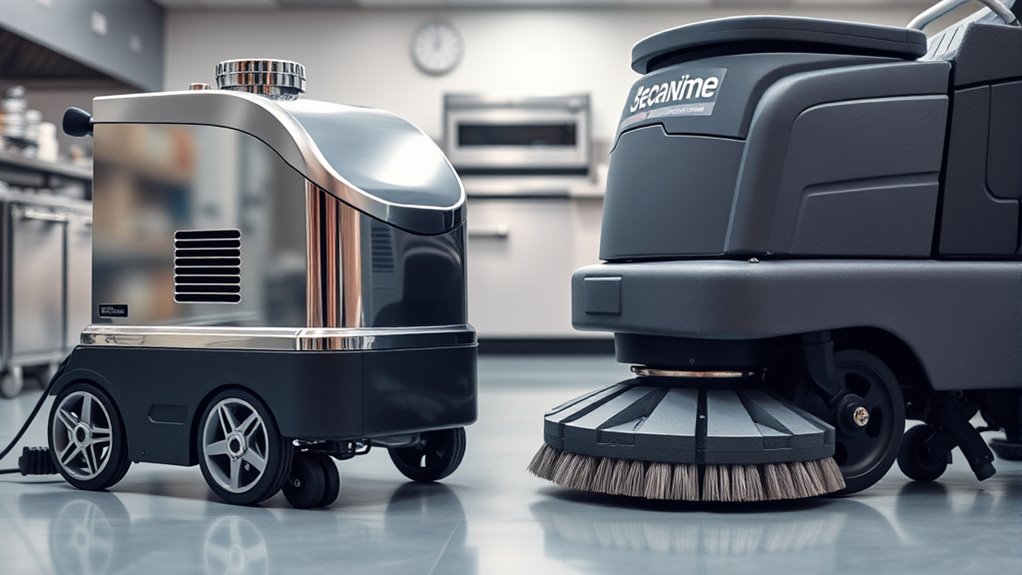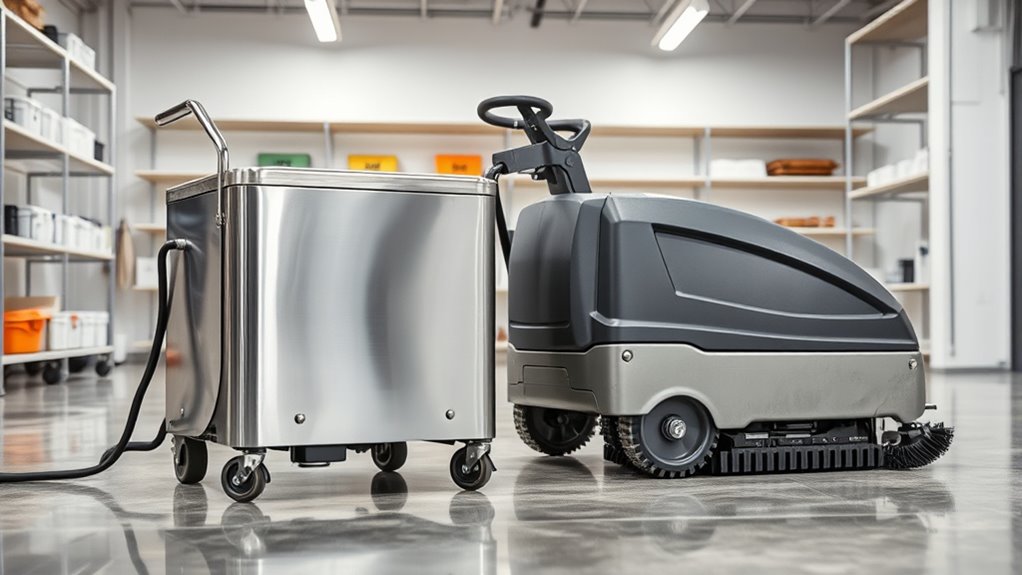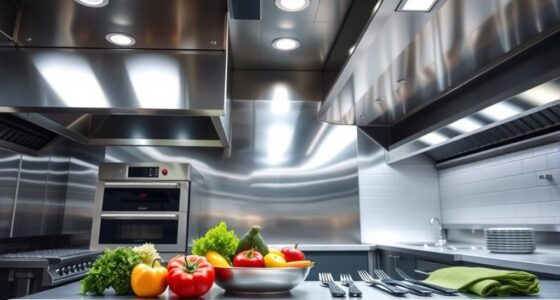Choosing between countertop and floor machines depends on your business needs. Opt for countertop units if you require precise, quick cleaning of small surfaces like counters or sinks. If you’re cleaning large areas such as hallways or warehouses, floor machines will save time and boost efficiency. Each offers unique benefits, so understanding your cleaning priorities helps you make the best choice. Continue exploring to discover which equipment best fits your operation’s goals.
Key Takeaways
- Countertop machines excel at detailed cleaning of small surfaces, ideal for quick touch-ups and precise sanitation.
- Floor machines are better suited for large areas, improving efficiency and reducing cleaning time for extensive spaces.
- Countertop units are smaller, easier to maneuver, and require less setup, making them suitable for frequent, detailed tasks.
- Floor machines have higher maintenance and operating costs but offer faster cleaning for large-scale jobs.
- The best choice depends on your business’s specific cleaning needs, surface size, and budget considerations.

When choosing cleaning equipment, it’s important to understand the differences between countertop and floor machines, as each serves specific needs. Your decision can considerably impact cleaning efficiency and maintenance costs, which are vital factors for your business. Countertop machines are designed for smaller, more detailed cleaning tasks. They excel at sanitizing surfaces like countertops, sinks, or small workspaces with precision. Because they’re smaller and more compact, they’re easier to maneuver and require less setup time, making them ideal for quick touch-ups or areas that demand detailed attention. However, their smaller size also means they might not handle large-scale cleaning tasks efficiently, potentially increasing the time it takes to complete bigger jobs.
Countertop machines excel at detailed cleaning but may be less efficient for large-scale tasks.
Floor machines, on the other hand, are built for larger surfaces like hallways, lobbies, or warehouse floors. They’re typically more powerful and designed to cover extensive areas quickly. This increased power often translates into better cleaning efficiency when tackling stubborn stains, dirt, or grime on floors. While they initially seem like a bigger investment, they can reduce the overall time needed for large cleaning jobs, ultimately saving you money in labor costs. That said, their size and power can lead to higher maintenance costs. Floor machines have more moving parts and larger motors, which require regular upkeep to keep them functioning smoothly. Additionally, they consume more energy, and repairs can be more expensive if issues arise.
Your choice should align with your cleaning priorities and budget constraints. If your business requires frequent, detailed cleaning of small surfaces, investing in a quality countertop machine makes sense. It offers high cleaning efficiency for precise tasks and tends to have lower maintenance costs due to its simpler design. Conversely, if your focus is on maintaining large areas swiftly, a floor machine is more suitable. Although it might cost more upfront and have higher ongoing maintenance costs, its efficiency in covering vast spaces can lead to long-term savings.
Understanding the performance capabilities of each type can help you choose equipment that best matches your cleaning demands. For example, selecting a comprehensive coverage machine can maximize productivity and ensure thorough cleaning. Additionally, smart features like app control and scheduling can streamline your cleaning routines and improve overall efficiency. Incorporating digital monitoring can provide real-time insights into equipment performance, helping you reduce downtime and extend the lifespan of your machines. Regularly evaluating the maintenance requirements of your chosen equipment will help prevent unexpected repairs and keep your cleaning operations running smoothly. Ultimately, the right choice hinges on understanding the scale of your cleaning needs and balancing initial investment with ongoing costs. A smaller, more precise countertop machine will serve well in environments that demand detail and finesse, while a floor machine shines in spaces where speed and coverage are paramount. Considering both cleaning efficiency and maintenance costs will help you select equipment that offers the best value for your business, ensuring you keep your space clean without overspending or sacrificing quality.
Frequently Asked Questions
How Do Maintenance Costs Compare Between Countertop and Floor Machines?
When comparing maintenance costs, you’ll find that countertop machines generally have lower repair frequency and warranty costs due to their simpler design. Floor machines tend to require more frequent repairs, which can increase your expenses over time. You should consider that warranties might cover some repairs, but ongoing maintenance like replacing brushes or belts will add to your costs. Overall, countertop machines often save you money on maintenance.
Which Machine Type Offers Better Versatility for Different Cleaning Tasks?
When considering versatility, you see that countertop machines excel at multi-purpose cleaning for small surfaces, while floor machines handle large areas efficiently. Countertop models often feature accessory compatibility for tasks like scrubbing and polishing, making them adaptable. Floor machines, however, are designed for heavy-duty tasks such as stripping and buffing. Your choice depends on whether you need precision or power, but both offer flexible solutions tailored to different cleaning demands.
Are There Specific Industries That Prefer One Type Over the Other?
Industry preferences often determine whether you choose countertop or floor machines, based on your cleaning environment. For example, hospitality and healthcare sectors favor countertop machines for their precision and ease of use in small spaces. Conversely, commercial cleaning services and industrial facilities prefer floor machines for large-scale tasks. Understanding these industry-specific needs helps you select the right equipment, ensuring efficient cleaning tailored to your environment.
How Do Energy Consumption Levels Differ Between the Two Machine Types?
Imagine your energy bill as a garden that needs tending. Countertop machines often sip power with their energy efficiency, keeping power consumption low and costs in check. Floor machines, on the other hand, can gulp more energy, especially during heavy-duty use. Choosing wisely means balancing your business’s cleaning needs with the desire to conserve power, ensuring you don’t waste resources chasing a spotless shine.
What Is the Typical Lifespan of Countertop Versus Floor Cleaning Machines?
You’re likely wondering about the typical lifespan of countertop versus floor cleaning machines. Countertop models usually have greater machine durability and may last around 3 to 5 years with proper maintenance, leading to less frequent replacements. Floor machines, due to heavier use and more demanding tasks, often require replacement sooner, around 2 to 4 years. Regular upkeep can extend each machine’s lifespan, saving you money in the long run.
Conclusion
Think of choosing between a countertop and floor machine as selecting the right brush for a masterpiece. Each tool paints a different part of your business’s canvas—one handles the detail, the other the grand scene. By understanding their roles, you craft a cleaner, more polished picture. When you pick the right tool for the task, your success becomes an artful masterpiece, perfectly balanced and beautifully executed. The choice is yours to make.









